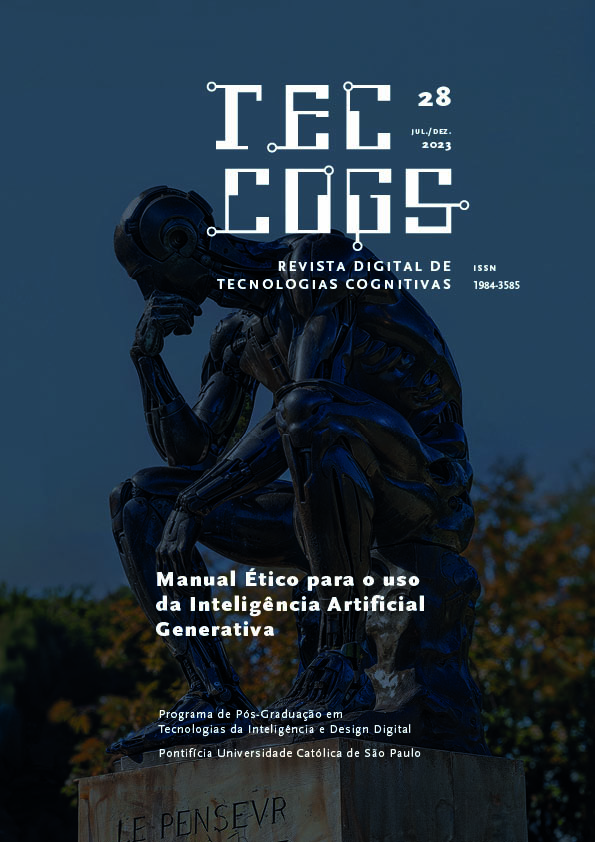Generative Artificial Intelligence creativity
DOI:
https://doi.org/10.23925/1984-3585.2023i28p119-130Keywords:
creativity, Generative Artificial Intelligence, prompt, product, innovationAbstract
The text aims to reflect on creativity using generative AI. The topic has been much debated due to speculative opinions that sometimes value the creative potential of tools or resources and sometimes depreciate their usefulness. The concept of human creativity is presented in the view of some authors and can be summarized as the ability to produce something original or innovative. The text discusses whether generative AI can simulate human creativity. Arguments are put forward to show that the processes of creation of man and generative AI are different, as algorithms are not capable of developing some human logic. However, generative AI can generate acceptable and interesting products as long as the prompt created by human intelligence, to encourage the generation of a product, is well constructed. The similarity between the products of generative AI and human works highlights the potential of this technology to expand the boundaries of creativity.
References
FLETH, Denise; VILARINHO-RESENDE, Daniela; ALENCAR, Eunice. O modelo componencial de criatividade de Teresa Amabile. In: NEVES-PEREIRA, Mônica Souza; FLEITH, Denise de Souza (orgs.). Teorias da criatividade. Campinas: Alínea, 2020.
CSIKSZENTMIHALYI, Mihaly. Creativity: Flow and the psychology of discovery and invention. New York: Harper Collins, 2013.
OSTROWER, Fayga. Criatividade e processos de criação. Rio de Janeiro: Vozes, 1977.
PRASS, Rochele Moura; MÜGGE, Ernani; BERNASIUK, Helen Lentz Ribeiro. Autoria em tempos de inteligência artificial generativa: um olhar para a produção ficcional contemporânea no Brasil. Revista Texto Digital, v. 19, n. 2, p. 75-106, 2023.
PLONSKI, Guilherme Ary. Inovação em transformação. Estudos Avançados, v. 31, p. 7-21, 2017. Disponível em: https://www.scielo.br/j/ea/a/3Vmk8zqHbrVcgBwhMTyTC7d/?format=html.
RÖHE, Anderson; SANTAELLA, Lucia. IAs Generativas: a importância dos comandos para texto e imagem. Aurora: Revista de Arte, Mídia e Política, v. 16, n. 47, p. 76-94, 2023.
SANTAELLA, Lucia. Há como deter a invasão do ChatGPT? São Paulo: Estação das Letras e Cores, 2023.
UC3M. Universidad Carlos III de Madrid. Guia: Recomendaciones para la docencia con inteligencias artificiales generativas, 2023. Disponível em: https://hdl.handle.net/10016/37989. Acesso em mar 2023.
WARD, Megan. Victorian fictions of computational creativity. In: CAVE, Stephen; DIHAL, Kanta; DILLON, Sarah. (eds.)AI Narratives: A history of imaginative thinking about intelligent machines. Oxford: Oxford University Press, 2020, p. 144-164.
Downloads
Published
How to Cite
Issue
Section
License
Copyright (c) 2024 TECCOGS: Revista Digital de Tecnologias Cognitivas

This work is licensed under a Creative Commons Attribution 4.0 International License.
Esta revista oferece acesso livre imediato ao seu conteúdo de acordo com a licença CC BY 4.0, em conformidade com a definição de acesso público do Directory of Open Access Journals (DOAJ).
Ao submeter um texto à TECCOGS, os autores asseguram que o material submetido à avaliação e eventual publicação não infringe de modo algum qualquer direito proprietário ou copyright de outros. Com a submissão, o autor transfere em efetivo os direitos de publicação do artigo para a TECCOGS. A transferência de copyright cobre os direitos exclusivos de publicação e distribuição do artigo, incluindo reimpressões ou quaisquer outras reproduções de natureza similar, além de traduções. Os autores mantém o direito de usar todo ou partes deste texto em trabalhos futuros de sua autoria e de conceder ou recusar a permissão a terceiros para republicar todo ou partes do texto ou de suas traduções. Para republicar números da revista na íntegra, qualquer interessado precisa obter permissão por escrito tanto dos autores como também dos editores da TECCOGS. A TECCOGS por si só pode conceder direitos relativos a emissões de periódicos como um todo.
Imagens com direitos autorais pertencentes a terceiros, que não foram concedidos ao autor do texto, devem ser utilizadas somente quando necessárias à análise e ao argumento da pesquisa, sempre indicando as respectivas fontes e autoria. A TECCOGS dispensa o uso de imagens meramente ilustrativas. Se desejar ilustrar um conceito, o autor deve indicar, em forma de URL ou referência bibliográfica, uma referência em que a ilustração esteja disponível.
---------------------------------------------------------------------------------
This journal offers free immediate access to its content under CC BY 4.0, in accordance with Directory of Open Access Journals' (DOAJ) definition of Open Acess.
When submitting a text to TECCOGS, authors ensure that the material submitted for evaluation and eventual publication does not infringe any proprietary right or copyright. Upon submission, authors effectively transfer the publication rights of the article to TECCOGS. The copyright transfer covers the exclusive rights of publication and distribution of the article, including reprints or any other reproduction of similar nature, in addition to translations. Authors retain the right to use all or parts of the text in future works of their own, as well as to grant or refuse permission to third parties to republish all or parts of the text or its translations. In order to fully republish issues of the magazine, anyone interested must obtain written permission from both the authors and the editors of TECCOGS. TECCOGS alone can grant rights relating to issues of journals as a whole.
Images whose copyright belongs to third parties that have not been granted to the author of the text should be used only when essential for the analysis and argument, always indicating theirs respective sources and authorship. TECCOGS dismisses any use of merely illustrative images. To illustrate a concept, the author must indicate, in the form of a URL or bibliographic reference, a source in which the illustration is available.


